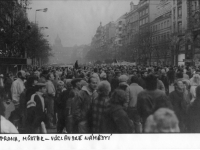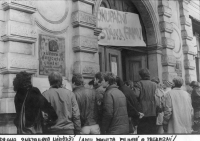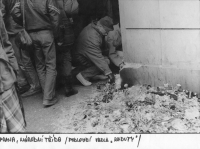Dad didn’t survive the heart attack. The ambulance was hampered by columns of occupiers
Download image
Petr Šimr was born on February 27, 1947 in Liberec into a mixed Czech-German marriage. His parents met during the war in Dresden and got married despite the reluctance of the authorities and Peter’s mother’s German family. Soon after the birth of two sons, they divorced and the mother decided to stay in the Czech Republic despite difficult living conditions. She gradually regained contact with her family in Dresden and they visited each other. During the 1960s, Peter and his peers were fascinated by rock’n’roll music and pop culture from the West. The Communists did not allow Peter to pass the final exams at the agricultural school when he refused to cut his longer hair. After attending Johnny Halliday’s concert, he was questioned by the State Security and taken to the compulsory military service prematurely. He worked at the Slovak military airport Sliač, where he also experienced the invasion of Warsaw Pact troops in August 1968. In connection with these events, his father succumbed to a heart attack. After the completing his compulsory military training, Petr Šimr joined the Liberec transport company as a driver. He witnessed protests there on the occasion of the first anniversary of the occupation. In 1972 he married his wife Maria and then their son was born. His desire to record the beginnings of family life led him to photography, which he later devoted himself to systematically. He and his colleagues founded a photo club at a transport company and graduated from the Institute of Fine Art Photography in Olomouc in the early 1980s. In 1984, he started working as a driver of the Naive Theatre and toured Western countries with theatre members. He visited France or West Berlin. During the Velvet Revolution, he carried important documents - posters, photographs or statements - between Prague and Liberec. After the regime change, he made a living as a freelance photographer, working for regional dailies and organizing his own exhibitions. In 2022 he lived in Liberec.





